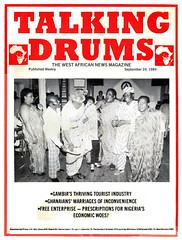Whispering Drums With Maigani
by Musa Ibrahim
Nigeria's Third Republic Coming
Elsewhere, it is being reported that "African countries complain that the western news services - the Associated Press, United Press International, Reuters and Agence France-Press - primarily advance the economic, political and cultural interests of their home countries. The news services are charged with reporting mainly the disasters, natural and man-made, in the African countries, rarely the progress, or even a constructive analysis of development problems in Africa".
But, coming to think of it, what else is there in Africa to report or talk about? From East, West, North and South, it is the same story - the story of a continent bedevilled by one internal strife after another. Today, as things continue to go wrong with the daily, dispassionate observers are wondering whether Africa has too soon exceeded her optimum size in population, govern- ment and administration as well as in all other sectors that need efficient management. The problems and short- comings and inadequacies are just too staggering and mind boggling. Is it the leadership, the system or the people? There is no knowing as long as we continue to destroy with increasing rapidity any system that we seem to find faults with. When a person develops a wound in one of his fingers, he does not cut off that finger, he nurtures it until it heals. So are systems. There are imperfections in all of them, but you don't correct them by destroying them, for one cannot correct what is no longer there.
When Nigeria attained her independence on October 1, 1960, she inherited the parliamentary system of govern- ment from her colonial masters, the British. But that system of government was terminated in 1966 through a military coup d'etat. That period from 1960 to 1966 is often referred to as Nigeria's First Republic. Several divergent theories ranging from the moral to the absurd have been advanced by political students and analysts as to why the First Republic collapsed. Whatever, it is no longer important. What is important, how- ever, is the fact that the Nigerian military were the ones responsible for the termination.
The period 1966 to 1979 is often called the era of military dictatorship, a period that was characterised by a bloody and costly civil war, an oil boom, squandermania, contract-mania, millionairamania and what have you. After thirteen gruelling years, the period came to an end and a Second Republic was born. The term Second Republic in this context refers to the system of rule which was inaugurated on October 1, 1979. This was marked by two events: First, the coming into being of the constitution of the Federal Republic of Nigeria 1979, and second, the installation of a popularly elected civilian as Executive President of the Federal Republic of Nigeria. Shortly after its fourth birthday, this republic crash-landed through the barrel of a gun. This time along, the soldiers did not intervene for nationalistic or patriotic reasons. They intervened because they wanted to have a second bite of the national cake. Remember their first thirteen years? It was oil-rich Nigeria and not Shagari's austerity Nigeria. Somehow, the soldiers could not believe Shagari that the country had no money. They had to be in government to find out and so struck.
Eight months after coming to power, the harsh realities are catching up with them. Already there are whispers and murmurs of regrets from Dodan Barracks for having intervened. At one stage some members of the Supreme Military Council had suggested calling back the politicians giving them back their problem country. But some have insisted it to be theatrically done-a system to be identified, a constitution drafting committee inaugurated, a constituent assembly formed, ban on polit lifted, elections conducted, and president sworn in. After all, what happens today has happened before and will happen again.
The stage has been set for round one - identification of a "suitable" system of government for Nigeria. And where can that be found? Outside of Nigeria of course! Charged with the responsibility are men, not of timber and calibre or with caterpillar and bull- dozer orientation but those with disreputable reputations. There is a defeated gubernatorial candidate, a deranged doctor and former member of the House of Representatives, an ex-Junior Minister without portfolio and an ex-Senator. Just like Jesus charged his disciples to "Go ye into all the world and preach the gospel to every creature", the Buhari-Idiagbon regime have charged these men to go ye into London, Washington and Moscow and bring a system of government for Nigeria. They were in London and have already been to the United States of America. It is the trip to Moscow that is being delayed because I hear they are not prepared to recommend communism to their masters back home. I don't blame them, for who wants to share everything, including his wife, with the proletariat as the communists do? So surreptitiously have these men been conducting their affairs that it took me a trip to Nigeria to really find out their mission when I heard they were leaving the country. So once again, Nigeria is seemingly on the verge of a political turmoil. But even then, could it be true? What is there to "copy" or "try" again? Is it the parliamentary system of government "fashioned" along that of Britain or is it the Presidential system "modelled" along that of America?
We have had them all. Anyway, come what may, here cometh Nigeria's Third Republic. The wonder is, what will it be this time around? What a country, what a bunch of people!
